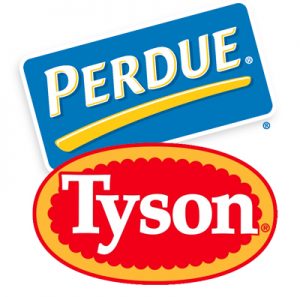 Top Class Action Lawsuits
Top Class Action Lawsuits
Don’t know what to say about this. Tyson and Perdue Farms are facing an antitrust class action lawsuit over allegations they engaged in a chicken price-fixing scheme. The lawsuit calls the industry’s means of destroying its livestock “unparalleled.” There are other terms that come to mind, but let’s get to the allegations.
Which are, specifically, that the companies were involved in killing hens and flocks and destroying eggs to limit production and raise the price of 98 percent of the chicken sold in the U.S. by nearly 50 percent.
The lawsuit, filed Sept. 14, 2016, in the U.S. District Court for the Northern District of Illinois, Eastern Division states that the laundry list of defendants control 90 percent of the wholesale broiler chicken market, an industry with more than $30 billion in annual revenue.
If you purchased chicken from any of the following suppliers, you may be entitled to your money back: Tyson, Perdue Farms, Pilgrim’s Pride, Sanderson Farms, Simmons Foods, Koch Meats, JCG Foods, Koch Meats, Wayne Farms, Mountaire Farms, Peco Foods, Foster Farms, House of Raeford Farms, Fieldale Farms, George’s Farms or O.K. Foods. Find out your rights to compensation.
The Tyson and Perdue lawsuit describes in detail how the chicken industry conspired together to raise prices, stating that in 2007, Pilgrim’s and Tyson attempted to cut production levels enough to cause industry prices to rise, but failed to impact the market due to their market share.
“In January 2008 Pilgrim’s and Tyson changed tactics and concluded that only through broader cooperation among major producers in the Broiler industry could supply be cut enough to force prices to increase,” the suit states.
Pilgrim’s and Tyson publicly told the industry that neither company would continue to cut production while their competitors used the opportunity to take away Pilgrim’s and Tyson’s market share. But a few days after an industry event in late January 2008, things changed. The lawsuit says that “other Defendant Producers followed Pilgrim’s and Tyson’s call to arms and made substantial cuts to their own production.”
After attending the industry event, Tyson’s CEO announced Tyson would be raising prices because “we have no choice.” A day later, a Pilgrim’s executive announced publicly that Pilgrim’s would be cutting its production and “the rest of the market is going to have to pick-up a fair share in order for the production to come out of the system.”
According to the lawsuit, unlike Pilgrim’s and Tyson’s prior production cuts, in 2008 the defendant chicken producers did not rely solely on ordinary mechanisms to temporarily reduce production, which would have permitted production to be quickly ramped up if prices rose.
“Instead, Defendant Producers cut their ability to ramp up production for 18 months or more by destroying Broiler breeder hens in their Broiler breeder flocks responsible for supplying the eggs Defendant Producers raise into Broilers. This destruction of the Broiler breeder flock was unparalleled,” the lawsuit states.
Top Settlements
Walmart & Sam’s Club Head into OT (Sort of…) Hey, football season just started up so forgive the pun… So there’s a couple of nice unpaid overtime settlements to report this week. First up…Walmart and Sam’s Club. They were facing an unpaid overtime class action lawsuit brought by certain employees who worked at the big box retailers. The plaintiffs asserted that they were not paid for missed meal and rest breaks or for off-the-clock work while employed by Walmart.
The potential class of plaintiffs in the lawsuit who may be entitled to benefits from the settlement is approximately 187,000 current and former hourly Pennsylvania employees at Walmart of Sam’s Club.
The class period is between March 19, 1998 and May 1, 2006.
The Walmart settlement amount is $62.3 million in statutory damages.
The lawsuit is Braun v. Wal-Mart Stores Inc., et al., March 2002 Term, No. 3127 and Hummel v. Wal-Mart Stores Inc., et al., August 2004 Term, No. 3757, in the Pennsylvania Court of Common Pleas in Philadelphia County.
Farmers’ Time to Pay Up. And…a $4.9 million settlement has been reached in an unpaid wages and overtime class action pending against Farmers Insurance Exchange.
The lawsuit was filed by Farmers’ adjusters in February 2014, who claimed that their work volume, deadlines and competitive rankings meant they frequently worked overtime without meal and rest breaks. It also claimed that up to 2015, Farmers had no stated break policy. Farmers’ practices violated state and federal overtime statutes, as well as California meal and rest breaks and unfair competition laws.
Under the terms of the Farmers settlement, the funds will be divided among the 2,114 plaintiffs, less 25 percent to cover legal fees.
The class is made up of claims representatives specializing in liability, automotive damage and residential property who worked in California between September 2011 and August 2016. On average, I is estimated that each plaintiff will receive $2,000, and members who worked throughout the class period could see more than $7,000.
The case is Alvarez et al v. Farmers Insurance Exchange et al., case number 3:14-cv-00574, in U.S. District Court for the Northern District of California.
Ka Ching! That’s a wrap folks—see you at the Bar.


 Top Class Action Lawsuits
Top Class Action Lawsuits Top Class Action Lawsuits
Top Class Action Lawsuits Top Settlements
Top Settlements  Top Class Action Lawsuits
Top Class Action Lawsuits Top Class Action Lawsuits
Top Class Action Lawsuits Top Class Action Lawsuits
Top Class Action Lawsuits Top Class Action Lawsuits
Top Class Action Lawsuits Top Class Action Lawsuits
Top Class Action Lawsuits